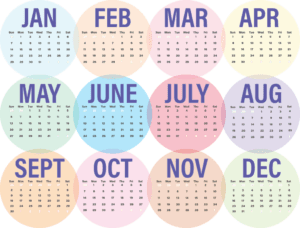Resolution Déjà Vu
Making New Year’s resolutions seems like a rather solid idea of encouraging self-improvement, so I try to set resolutions each year. But the problem is that resolutions are almost always going to fail. I don’t say this lightly: only about 8% of people who set resolutions are able to keep them through the end of the year!
 I have yet to find myself in that elusive 8% of people who keep their resolutions. Instead, I’m always a part of the 92% who just … fail. This does not dissuade me each year from setting resolutions. The issue though is that I have resolution déjà vu. This seems familiar. Or, Hmm, I think I’ve set this resolution before and Hey, wasn’t my goal last year to read more? are all familiar refrains in my head when it comes time to choose what I want to improve upon in the coming year.
I have yet to find myself in that elusive 8% of people who keep their resolutions. Instead, I’m always a part of the 92% who just … fail. This does not dissuade me each year from setting resolutions. The issue though is that I have resolution déjà vu. This seems familiar. Or, Hmm, I think I’ve set this resolution before and Hey, wasn’t my goal last year to read more? are all familiar refrains in my head when it comes time to choose what I want to improve upon in the coming year.
Well, friends, I’m ready for a change. I don’t want resolution déjà vu again. So I’m approaching things differently this year.
I’m doing away with the year-long change.
Yes, there are things that I want to work on all year. But I think part of the problem comes with setting 10 goals for the entire year and trying to change all of these things at once, starting January 1st. I refuse to set myself up for failure like that this year.
Instead, I plan to set some goals, but focus on one a month. For example, my January goal may be to work on remembering all of these special things about my kids by writing things down in a journal that I want to remember. When February rolls around, I’ll re-evaluate. Do I need another month of practice before setting another goal? If the answer is yes, I’m giving myself that chance. But if I’ve got it down, then I’ll work on continuing that while adding another small goal to work on in February.


I’m setting small, reasonable goals.
As I mentioned above, I want to do a better job of writing down things that my kids say and do that I want to remember in the future. A big, vague goal such as “journal more” wouldn’t help me. I need specifics to focus on, so my goal instead will look like, “On Monday and Saturday mornings, write down a few memories of the week / weekend. There is no length requirement.” A focused goal like this with a time embedded in will help me to focus.
I think this applies to many resolutions that people set each December for the upcoming year – common resolutions like “eat healthier” or “lose weight” or “exercise more” could be made much more realistic with a very focused goal. Instead of “exercise more” as a yearly resolution, my monthly goal could be “Take a 20 minute walk with the kids after afternoon snack twice a week.”
I’m not giving up at the first failure.
I truly believe this has been one of my big problems with setting resolutions in the past. For example, if I were to miss a journaling session, it would have been very easy for me to just quit. Well, there goes that. I missed one. I have to catch up now on all the ones I’ve missed. This is crazy and is definitely a set-up for failure. This year, I’m planning on failing. I know that I will mess up on my goals. The difference is that I’m going to allow myself to be human. Instead of waiting for next January to start over again … I’ll get a fresh start tomorrow.
















